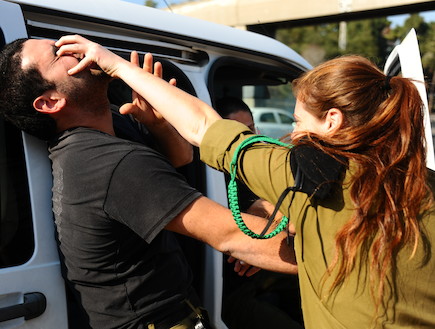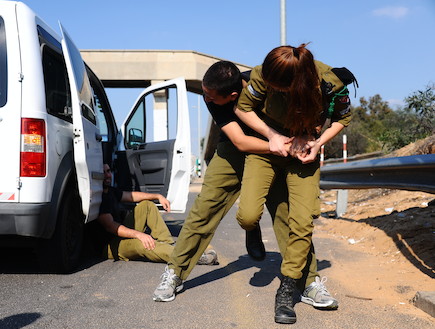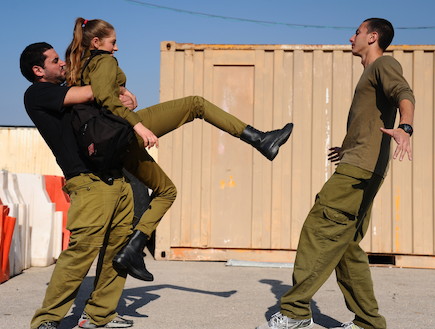I believe worship of God, the Father, Son, and Holy Spirit, is the number one responsibility of our lives and should be our number one priority. It is the highest form of prayer, but it seems we often fail to recognize how important it is, and the power that true worship holds. Because of our lack of understanding and our inhibitions we have not given God the praise that is due Him and that He desires. I want to learn to worship better. And then I want to actually do what I am learning. For this to happen, I also need freedom from inhibitions. I often find myself concerned about what others are thinking and if they are watching me. This inhibits my true expression of worship. I pray I will not allow others' opinions to hinder something I know pleases God.
We had a pastor in Omaha once whose favorite saying was, "If you please God it doesn't matter who you displease, but if you displease God it doesn't matter who else you please." I truly want to please God, don't you?
I like the way James Goll has condensed the reasons for worship, the ways in which worship can be entered into and demonstrated, and
A. The Entrance into His Presence
1. Psalm 100:4 (NASB) tells us, "Enter His gates with thanksgiving, and His courts with praise. Give thanks to Him, bless His name."
2. As you enter into praise, meditate on the provision the Lord has made for
you through the Blood of Jesus (see Hebrews 10:19; 12:24 NASB).
B. Praise God for Who He Is!
1. The source of praise is the Holy Spirit activating your spirit/soul to express approval and adoration of God's greatness.
a. Psalm 51:15 (NASB) O Lord, open my lips, that my mouth may declare Your praise.
b. Psalm 119:164 (NASB) Seven times a day I praise You, because of Your righteous ordinances.
2. As you begin to praise the Lord, your spirit and soul will rise up to higher levels of exuberance and joy. You will become enlightened with a revelation of WHO HE IS! You will then find faith rising up within, declaring, "Nothing is too difficult for You (God)" (Jeremiah 32:17b, NASB).
C. Thank Him for What He Has Done (and what He will continue to do)
1. Thanksgiving awakens your love toward God, as you acknowledge that you are His child.
2. Thank Him that He gives every good and perfect gift to you (see James 1:17).
3. Respond with joy to Him for His benefits and ways.
a. Proverbs 3:6 (NASB) In all your ways acknowledge Him, and He will make your paths straight.
b. Psalm 116:12,17 (NASB) What shall I render to the Lord for all His benefits toward me?...To You I shall offer a sacrifice of thanksgiving...
D. Seven Hebrew Words
1. Towdah - Sacrifice of thanksgiving or praise; to render thanksgiving or praise. See Psalm 42:4; 100:4.
2. Yadah - To throw, thrust, or cast away from; hands outward; to throw hands into the air. See Psalm 67:3; 107:8, 15, 21, 31.
3. Barak - To bless, to give thanks and praise to God because He has given out of His abundance; to bless as an act of adoration, to kneel. See Psalm 31:21; 63:4; 95:6.
4. Halal - To make a show or boast, to be clamorously foolish, to go about in a raging or raving way, to dance, to celebrate. See Psalm 56:4; 150:1-2.
5. Zamar - To celebrate with instruments, to praise the Lord skillfully on an instrument, to touch strings with the fingers. See Psalm 21:13; 33:2; 98:4.
6. Tehillah - Imperative summons to praise Jehovah. A psalm or a hymn, by choirs, with dancing and expressive speaking; festal jubilation. See Psalm 22:3,25; 33:1; 35:28.
7. Shabach - To praise, comment, soothe, still; adoration towards the power, glory, and sanctity of the Lord; to praise God for His mighty acts and deeds; to triumph in a loud voice. See Psalm 63:3; 117:1; 147:12.
E. Examples of Bodily Expression through Praise
1. When you clap your hands and stomp your feet, you portray your excitement (2 Kings 11:12; Psalm 98:8; Isaiah 55:12; Lamentations 2:15; Ezekiel 6:11).
2. When you stand up, march, or walk, you portray readiness to serve or to go (Genesis 13:17; Deuteronomy 11:22-25; Joshua 1:15; Psalm 68:7-8).
3. When you lift your hands, you are worshipping and surrendering to God (Exodus 17:8-16; 1 Kings 8:22-24; Psalm 28:2; 63:3-4; 134:2; 141:2; Luke 24:50-51; 1 Timothy 2:8; Hebrews 12:12).
4. When you dance, you express great joy (1 Samuel 18:6-7; Psalm 30:11; 149:3; Jeremiah 31:13; Luke 15:11-24).
5. When you sing, you express gladness of heart (Psalm 68:25; 100:2; 108:1; Proverbs 29:6; Isaiah 26:19; 65:13-14; Jeremiah 31:7; Zechariah 2:10; 1 Corinthians 14:15; James 5:13; Revelation 15:3).
6. When you play skillfully on an instrument, you show forth adoration (1 Samuel 16:23; 18:67; 2 Chronicles 5:13-14; 34:12; Psalm 33:3).
7. When you fall prostrate (fall down flat in homage to royalty or to God), you portray deep emotion and total surrender to God (Psalm 72:11; Isaiah 45:14).
8. When you kneel, you are portraying humility and dependence upon God (2 Chronicles 6:13; Matthew 17:14; Mark 1:40). Kneeling is asking for mercy (Luke 22:41; Acts 9:40; 21:5).
9.When you sit down or keep silent, you show forth rest and trust in God (Exodus 14:14; Joshua 6:10; Job 2:13; Proverbs 13:3; 17:27; Amos 5:13;
Matthew 8:4; 12:16; 27:14; Luke 23:9; John 8:6).
F. What Does Extravagant Praise Do?
1. It blesses the Lord (Psalm 66:8; Luke 24:52-53).
2. It brings you into His presence and draws you closer to Him (Psalm 100:4).
3. It opens doors and makes rough places smooth (Isaiah 60:18; Acts 16:25-26).
4. It defeats the devil (Psalm 149:5-9; 2 Kings 11:13-14).
5. It brings revival (2 Chronicles 31:2; 34:12; Psalm 107:32).
6. It keeps you happy and gives you joy (Isaiah 61:1-3; Acts 2:45-47).
(This outline is part of the "Compassionate Prophetic Intercessor" by James W. Goll.)
Blessings to You!





































